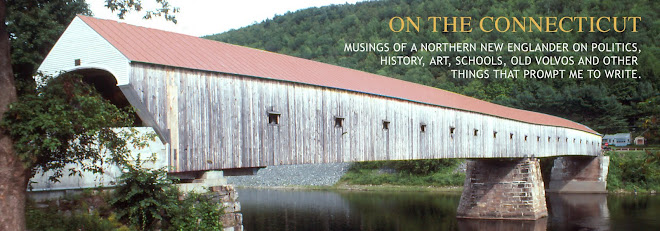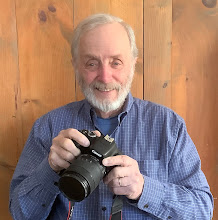My first year of college didn’t go well.
I was a naïve kid from a small town in New Hampshire. I didn’t fit in with the rich prep school types. I didn’t like my alcoholic ex-Navy roommate. And I wasn’t interested in the courses. So I took a year off to figure out what to do next.
I went back to my summer job at Silver Lake State Park; but when fall came, I was out of work. I stopped for a haircut at Dick Navaroli’s barbershop in mid-September. The shop was located next to the Red & White, downstairs from Dick's apartment in the old hotel building everyone called The Block.
Dick was a nice guy and a good barber, and he loved to talk. When I walked in, Jack Boyd was sitting in the brown leather upholstered barber chair with a crisp, light-blue barber’s cloth snapped around his neck. Dick chattered away as he finished the haircut.
“What’s Mr. Karl up to today,” he asked. Dick always called me Mr. Karl.
“Looking for a job,” I replied
“What are you looking for?” Jack asked as Dick brushed the loose hairs off his neck with a powdered neck duster.
“Anything that pays well.”
Jack sized me up. I was a skinny eighteen year-old kid. “Think you can handle a tough job?”
“What kind of a job?”
Dick unsnapped the barber cloth and drew it aside. Jack stood up and looked me in the eye. “You know where Nashua Brass is?”
“Yes.”
“Be there tomorrow morning at eight. I need some help in the foundry.”
Then he paid for his haircut and left.
“That was good timing,” Dick said as I climbed into the chair.
I was there at eight sharp the next morning. Jack showed me around the old brass foundry. There was a furnace room with two big furnaces and a large molding room where a dozen men worked. It probably hadn’t changed in a hundred years, and OSHA was still eight years away.
The pay was good, so I took the job.
When I punched in the following morning , Jack introduced me to Lionel Ledoux, an avuncular French-Canadian in his early 50s who spoke with a thick accent. Lionel would be my work partner and mentor.
The daily routine was simple. For most of the day, we sat at grinding wheels in one corner of the molding room, removing the flashing from brass castings. Flashing is the extra material left by seams in the mold. It was a mindless job, interrupted every two hours when we helped with the pour-off.
Lionel and I hit it off right away. He talked constantly in his hoarse, gravely voice as we sat at adjacent grinding wheels. He was a diligent worker who had been at the company for 22 years. The high point of his week was Saturday night out at Duke’s, a bar and strip club in nearby Tyngsboro, Massachusetts.
“You come with us this week,” he said.
“I don’t have an ID.”
“Not to worry. You don’t need one with me.”
When a bell rang, we strapped on leather leg protectors that looked like something a baseball catcher might wear, a thick leather apron and heavy leather gloves with cuffs that went almost to our elbows. Then we walked to the furnace room for the pour-off.
Brass is an alloy of copper and zinc that has been made by man for several thousand years. The copper and zinc are melted together, and the molten liquid is poured into a mold made by packing fine sand around a master pattern in a casting flask. The pattern is then removed leaving a cavity with a channel for pouring in the molten brass. After pouring, the brass cools and solidifies, and the sand is removed.
The melting point of copper is about 2000 degrees F. The furnace room was the closest thing to hell that I ever experienced. The heat from the furnaces was overwhelming, and the roar was deafening.
The furnace operator was a huge bald man who wore a strap undershirt under his apron. His muscled arms and shoulders were covered with sweat and grime. In the glow from the furnace, he looked like a guard at Satan’s door.
Recessed into the floor in front of the furnaces was an oven for preheating large ceramic pots to the same temperature as the molten brass. When the cover was pulled aside, you had to straddle a three-foot wide, 2000° hole in the floor, reach in with a pair of long-handled tongs and lift out a twenty-five pound pot that was wedged in among a bunch of others.
There were no guardrails. It was so hot you couldn’t breathe. And the heat dried out your eyes almost instantly. It was the most frightening task I’ve ever faced.
After lifting the pot from the oven, it was locked into a large iron clamp and a long iron bar slid though a ring in the clamp. Lionel and I then carried it by the iron bar to the furnace, where it was filled with molten brass.
The pot had to be held very steady when the big furnace tilted foward. If the hot molten spilled onto the cool concrete floor, it spattered like water in a hot frying pan. Once filled with molten, the whole thing weighted about 150 pounds.
We then carried the pot out to the molding room where the molders would pour the molten brass into their casting flasks. There were three teams of two men, and each team repeated this procedure several times during each pouring. It was a hot, dirty and dangerous job.
One morning during my second week, a molder bumped a full pot of molten against the side of his casting flask as he began to pour. Molten brass spilled to the floor and spattered everywhere. A glob of it bounced up onto my left leg between the apron and my leg protector and set my jeans on fire.
I struggled to brush it away and put out the fire with my left hand while holding my end of the iron bar in my right and without spilling any more molten. The foreman saw what was happening and rushed over. He summoned another molder to take over for me while I went to his office for first aid.
The burn was painful but not serious, and the foreman dressed my wound.
“You handled yourself pretty good out there,” he said. “Somebody could’ve really got hurt.”
After that rite of passage, I was accepted.
Several weeks later, I came down with a strange ailment. Every night, I felt like I was coming down with the flu. I was feverish, nauseous and ached all over. I went to bed early and by morning was fine. I assumed it would pass.
It didn’t. One morning after a particularly bad night, I mentioned it to Lionel.
“Oh that’s just the brass shakes,” he told me. “I still get them. You get used to it.”
I left Nashua Brass soon after. I never got a chance to take Lionel up on his invitation to Duke’s.
I’ve since learned it was metal fume fever, also known as brass founders' ague, brass shakes or zinc shakes, and is caused by exposure to fumes from zinc or magnesium oxide. The symptoms are caused by an immune reaction when the inhaled fumes injure the cells lining your airways. It also modifies proteins in your lungs. The modified proteins are then absorbed into your bloodstream, where they act as allergens. Continued exposure can lead to leukocytosis, kidney failure and death.
I often wonder how much longer Lionel lived.
I'm just a gigolo...
-
OK. The truth be told, I guess I was a gigolo at one time.
I wasn't trying to be. But a woman I had sex with paid me for my time. It
started cuz I missed w...

















